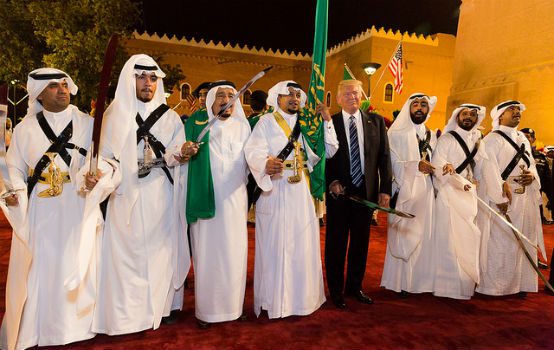Trump’s ‘Foolish and Dangerous’ Approach to Saudi Arabia

Bruce Riedel reports on the destabilizing effects of Mohammed bin Salman, the Saudi crown prince. He concludes:
The Trump administration has given Saudi Arabia a blank check and supports its war in Yemen. The crown prince has been touted by the White House. It’s a foolish and dangerous approach.
The Saudis need American and international support to end the war in Yemen that costs it $5 billion a month and is eroding the kingdom’s stability. The crown prince has staked his reputation on winning a quagmire at a horrific human cost. His American friend ought to be looking for an honorable but above all early end to the tragedy.
The Saudis would be wise to end their misbegotten war on Yemen, but unfortunately the crown prince and his admirers in Washington are sorely lacking in wisdom. The war been a catastrophe for the people of Yemen, and it hasn’t benefited the Saudis and their allies, either. Saudi Arabia is less secure than it was when they attacked. It has made them the bitter enemies of tens of millions of people, and they have gained nothing in the process. The war is a failure, and it has already cost far more and lasted far longer than any of its supporters expected. The smart thing would be to stop the campaign now, lift the blockade, and end their interference in Yemen. But thanks to the Trump administration’s unconditional support, the Saudis and Emiratis see no need to do any of this. Following Pompeo’s bogus certification, they know that the administration will say and do anything to cover for their crimes.
The report notes that Mohammed bin Salman is not necessarily guaranteed to succeed to the throne when his father dies:
Fearing for his security, the crown prince is said to spend many nights on his half-billion-dollar yacht moored in Jeddah. It’s a floating palace longer than a football field and with many perks. It is also a potential escape hatch.
As long as his father is on the throne, the crown prince is probably the most likely heir. If the king dies suddenly and soon, the succession may be disputed and even violent. In time, and with greater success in policymaking, the king’s legitimacy may flow to his son. But not now.
The crown prince’s rapid rise has antagonized too many people in Saudi Arabia, and so far he shows no sign of learning from any of the blunders he has made over the last few years. His fall may prove to be as fast and abrupt as his ascension.
Riedel makes an important observation that Saudi Arabia is less stable now than it has been in the last half century. The U.S.-Saudi relationship was based in part on the assumption that preserving the kingdom’s stability was in the best interests of both states, but the kingdom’s current leadership has been putting that stability at risk and it has been encouraged in this by mindless “pro-Saudi” boosters in Washington. The most hard-line, unquestioning American supporters are often the worst enemies that a state can have. They indulge the state’s leaders in all of their worst habits, they allow those leaders to act recklessly without fearing any consequences from Washington, and they encourage the state they “support” to drive itself off a cliff. A “no daylight” approach to client states ends up being costly and damaging for both the patron and the client. As Riedel says, it is a “foolish and dangerous approach,” and it is one that promises nothing but grief for both the U.S. and Saudi Arabia in the years to come.
Comments